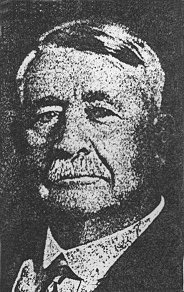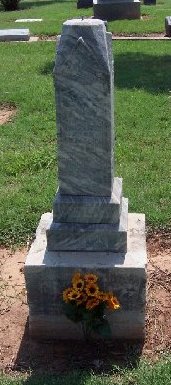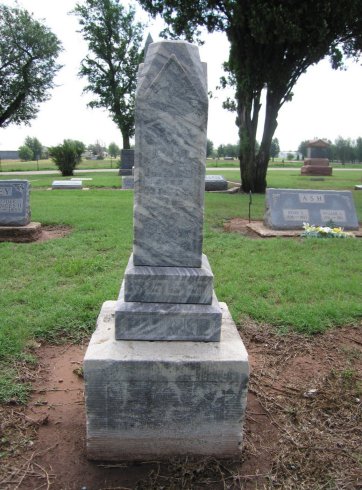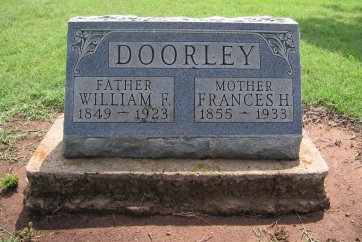
At left: Cash M. CadeThe first Mayor of both Coldwater, Kansas, and Kingfisher, Oklahoma.
About everybody who lived in Comanche-co. during the latter 80s (1880s) knew Cash M. Cade and Robt. C. Palmer, who were prominent citizens of Coldwater from 1884 to 1889. When a portion of the new state of Oklahoma was opened for settlement in 1889, Mr. Cade and Mr. Palmer joined the crowd which flocked to that country, and each remained there and was active in the up-building of that state. Mr. Palmer died over 30 years ago. Mr. Cade is still an active and prominent business man in Shawnee, Okla., where he is engaged in banking.
In an interview printed in a recent issue of The Shawnee News, Mr. Cade tells in a very interesting way of the life-time acquaintance of himself and Mr. Palmer. We believe that his story will be of much interest to Comanche-co. people, especially to the early settlers of the county who still survive, hence we reprint the article. The News reporter says:
"Yesterday I had related to me a story of brotherly love that has survived the hour glass by which time is measured and has persisted even after the Grim Reaper has claimed his own. For 32 years Cash M. Cade of Shawnee, has been making a pilgrimage to a little cemetery in Kingfisher, Okla., where he has been keeping a tryst with the dead. Every Decoration day since 1893, with the exception of one, this loyal friend has placed a flower upon the grave of R. C. Palmer, who for eight years, was his bosom companion and closest friend. In 1913 Cade was traveling in Europe and was unable to make his pilgrimage to the shrine of friendship, but in distant lands his thoughts turned to this friend of pioneer days, and by special arrangements the grave was decorated through Cade's direction.
"When Decoration Day comes around, just drop a flower on my grave Palmer told his friend shortly before he died. This simple request had become a command in the life of Cade.

At left: Gravestone for Robert C. Palmer, Kingfisher Cemetery, Kingfisher, Oklahoma.Photo courtesy of Allen Shutler.
"The story of the two men's friendship is one that goes back to the pioneer days and carries through the frontier epoch of Oklahoma. Mr. Cade tells the story well:
"It was back in 1885 at Coldwater, Kans., that I first met Robert Palmer. The democratic convention was in session and was being presided over by Judge J. D. F. Jennings, father of the famous Al Jennings. Like all other conventions in those days, everything was 'set' before the convention opened and the 'whips' only recognized those who were in accord with their policies. As a republican I was enjoying the convention immensely. Palmer was a delegate from Glick-twp. He asked recognition, but it was refused. A frail wisp of a young man, weighing 115 pounds, freckled of face, red of hair, I believe he was one of the homeliest men I have ever seen. But he clamored for recognition from the chair and finally his friends, placing him on their shoulders, carried him to the platform. Gaining recognition in this manner, Palmer unloosed one of the most powerful party speeches I have ever heard. He captivated his entire audience, and so wildly did they cheer that the floor of the building was stomped in and the convention had to be adjourned to another building.
"I was so impressed with Palmer's oratory that I looked him up after the meeting and invited him to visit me in my office. After some conversation, I learned that he was penniless and his health was bad. My sympathy and interest aroused, I asked him to move into the city and share my office free of charge. This offer was accepted. We came to Oklahoma together in 1889. Palmer soon had worked up a good deal legal business and became a partner of C. O. Blake, a well known lawyer of El Reno, who died a short time ago. Blake was later general counsel for the Rock Island railroad. In those days, we practically made our own laws and enforced them. Palmer became head of the arbitration board of the provisional government. It was his duty to settle claims arising over disputed ownership to town lots. Out of the hundreds of claims he decided, only two have ever been reversed.
"But Oklahoma was a fatal spot for Bob. He contracted tuberculosis. I took him to Old Mexico and later to San Antonio, Texas. He showed great improvement at San Antonio and gained about 15 pounds in weight. I begged him to remain in Texas, but he refused, saying he was going with me. We returned to Oklahoma and the attack of tuberculosis again started, gradually forcing Palmer to the grave.
"A few days before he died we called in his old family physician, who cared for him day and night until the end. Finally when Bob's lungs had completely collapsed and he was in intense pain the physician decided it would be a mission of mercy to permit Bob to pass out easily. Therefore the evening before he died the doctor prepared a large dose of morphine. Just before he administered the medicine the 6 o'clock whistle sounded. 'Well, Bob,' the doctor said, 'that will be the last time you will ever hear that whistle.' Bob lapsed into unconsciousness. None of us ever thought he would ever speak again. But about three o'clock in the morning Bob aroused himself and asked for a lady who was formerly his secretary. We drove overland for her and Bob conversed with her before he died the next morning.
"When the 6 o'clock whistle sounded on the morning of his death, Bob grinned good naturally at the doctor and told him he was a liar. He passed away that day. Andrew J. Seay, second governor of the territory of Oklahoma, wrote the epitaph on the grave of Robert Palmer. It reads: 'Here rests a good lawyer and an honest man."
"For many years W. F. Doorley of Kingfisher has been helping me to decorate Bob's grave. Last year Doorley forecast his own death to me by saying, 'Next year you will decorate Bob's grave alone, but I will still be here." Doorley died the past winter and is buried on the same lot with Palmer.
"Bob was a fine man, generous, free hearted and honest. I shall keep my promise to decorate his grave as long as I live. He was my friend."


